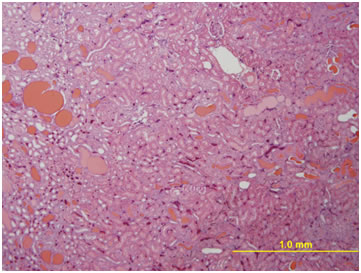Etiology: Development of the disease is influenced by genetics, sex, age, hormones, diet, and microflora.
Incidence: The incidence of this disease is common in aged rats. It occurs most often in SD and Fischer 344 rats and is more common in males.
Clinical Signs: Progressive weight loss and polyuria/polydypsia are clinical signs of this disease.
Pathology: Grossly, kidneys are pale tan with a pitted surface. Histologically, there is mesangial thickening, glomerular capsule adhesions and accumulation of protein in tubular lumens with progressive tubular atrophy and other degenerative changes [2].
Diagnosis: Diagnosis can be made by the detection of protein in the urine or by performing histopathology on kidneys.

2. Barthold, S.W., Chronic Progressive Nephropathy In Aging Rats. Toxicologic Pathology, 1979. 7(1): p. 1-6.